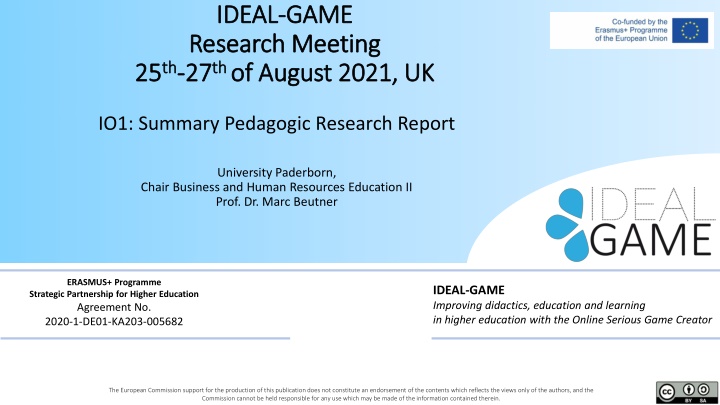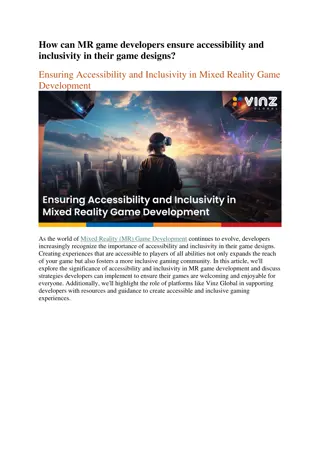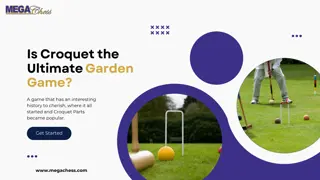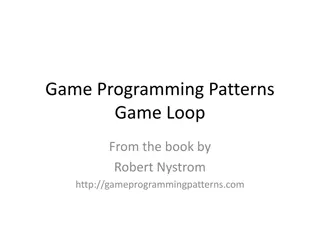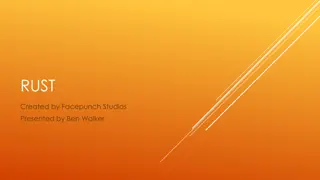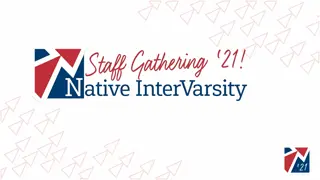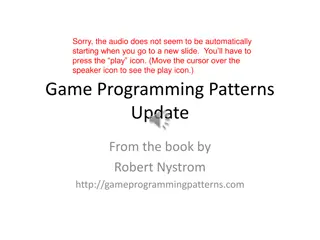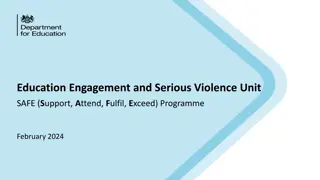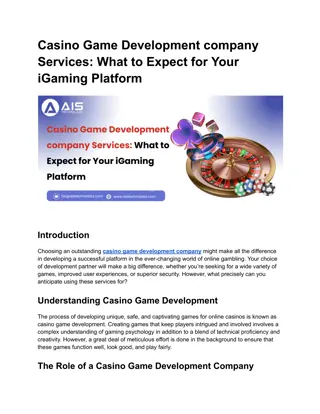Improving Education Through Online Serious Game Creator Research Report
Enhance pedagogic research in higher education using an Online Serious Game Creator. The project involves research meetings, conferences, and questionnaire-based studies to improve learning methods. It focuses on creating serious games based on research reports and integrating them into educational platforms. The summary report includes literature review results, existing IT experiences, and flipped classroom concepts. The project aims to enhance didactic approaches and educational strategies for students and educators in higher education.
Download Presentation

Please find below an Image/Link to download the presentation.
The content on the website is provided AS IS for your information and personal use only. It may not be sold, licensed, or shared on other websites without obtaining consent from the author.If you encounter any issues during the download, it is possible that the publisher has removed the file from their server.
You are allowed to download the files provided on this website for personal or commercial use, subject to the condition that they are used lawfully. All files are the property of their respective owners.
The content on the website is provided AS IS for your information and personal use only. It may not be sold, licensed, or shared on other websites without obtaining consent from the author.
E N D
Presentation Transcript
IDEAL IDEAL- -GAME Research Meeting Research Meeting 25th th- -27 27th of August 2021, UK GAME th of August 2021, UK 25 IO1: Summary Pedagogic Research Report University Paderborn, Chair Business and Human Resources Education II Prof. Dr. Marc Beutner ERASMUS+ Programme Strategic Partnership for Higher Education Agreement No. 2020-1-DE01-KA203-005682 IDEAL-GAME Improving didactics, education and learning in higher education with the Online Serious Game Creator The European Commission support for the production of this publication does not constitute an endorsement of the contents which reflects the views only of the authors, and the Commission cannot be held responsible for any use which may be made of the information contained therein.
IDEAL-GAME IO1: Summary Pedagogic Research Report IDEAL-GAME Research and Development Conference Online Project Meeting 25 to 27 of August 2021 Project Number: 2020-1-DE01-KA203-005682 -2-
Current Current status status of of IO1 IO1 IO1: Summary Research Report Leading Organisation: UPB Duration: 01/09/2020 to 28/02/2021 Part 1: Desktop Research Part 2: Field-Based Research Questionnaire (100 participants per partner; Online Survey) Summary Pedagogic Research Report Translations into national languages -3- 3
Current Current status status of of IO1 IO1 Part 1: Desktop Research Research Report (UPB, UPIT, WSEI, UoD and UDIMA) Specific research results conducted by IK Part 2: Field-Based Research Questionnaire (100 participants per partner; Online Survey) Target group: students / learners, teachers/ lecturers and professors of higher education Writing Summary Pedagogic Research Report (UPB) (in progress) -4- 4
Current Current status status of of IO1 IO1 Writing Summary Pedagogic Research Report (UPB) Composing data of the partners (UPB) Correction of English Research Report (UoD) Translation in national language (UPB, UPIT, WSEI, UDIMA) (latest until 31/08/2021) Creation of Serious Games on the basis of the translations of the research report and integration on the website (IK) (latest until XX/XX/2021) -5- 5
Summary Research Report Summary Research Report - - Structure Structure 1. Executive Summary 2. Introduction 3. Part A: Results of the literature review in partner countries 3.1. Existing experiences with the use of IT, digital environments and the flipped classroom concept and its didactic approaches 3.2. Status quo about currently strategies for activating learners in lectures 3.3. Existing experiences with the use of Serious Games in higher education and its pedagogical approaches 3.4. Opportunities and challenges concerning the use of mini Serious Games in lectures 4. Part B: Results of the online questionnaires survey applied in partner countries 5. Part C: Specific research results conducted by IK 6. Conclusions and Recommendations -6- 6
Summary Research Report Summary Research Report First First insights insights Part A: Results of the literature review in partner countries -7- 7
Summary Research Report Summary Research Report First First insights insights Part A: Results of the literature review in partner countries 3.1 Existing experiences with the use of IT, digital environments and the flipped classroom concept and its didactic approaches UPB: Many years of experiences with the use of new media, digital environments and flipped classroom concepts. Created several e-learning tools for didactical use in the field of higher education. Examples of successfully completed Erasmus+ projects in this field: MATH, GET-UP, Shadows, SMART, Learning Map, YES. Example of a self-developed classroom-response-system for higher education: PINGO Used by lecturers in their courses with theirs students to engage them in discussions and provide live feedback immediately. UPIT: High level of expertise on OER (Open Educational Resource) and OEP (Open Educational Practices) as well as flipped classroom approaches in digital environments. Especially during the pandemic, IT was increasingly used and digital environments were created. Due to modernisation measures starting in 2015 until 2020, the University of Pitest has a digital environment and successfully practices with it. -8- 8
Summary Research Report Summary Research Report First First insights insights Part A: Results of the literature review in partner countries 3.1 Existing experiences with the use of IT, digital environments and the flipped classroom concept and its didactic approaches WSEI: Great wealth of experience in preparing applications, implementing and coordinating projects, which have been selected for funding under the range of EU initiatives. They focus on building bridges between business and academic sector, creating links between work and education through new innovative methods and tools to academic curricula. UoD: Extremely strong STEM connections and their research focuses on how best to educate students across all levels of formal education. They have been practicing for several years wit the use of IT and its didactic approaches. With technological advancements and an understanding of the importance of learner-centred teaching along with the creation of personalised learning environments and active learning, higher education staff are increasingly using digital technologies. UDIMA: Extensive experience in national and European research projects, mainly within the Erasmus+ Program, many of them related to education and new technologies. As the first private distance university in Spain, its methodology is based on distance training, making use of the latest information and communication technologies, which implies the use of IT, digital environments and flipped classroom concepts. -9- 9
Summary Research Report Summary Research Report First First insights insights Part A: Results of the literature review in partner countries 3.1 Existing experiences with the use of IT, digital environments and the flipped classroom concept and its didactic approaches To sum up: All partners anchor IT in their daily work All partners have a wealth of experience in dealing with IT All partners work in a digital environment All have had their individual experiences with the flipped classroom -10- 10
Summary Research Report Summary Research Report First First insights insights Part A: Results of the literature review in partner countries 3.2 Status quo about currently strategies for activating learners in lectures UPIT: Activation through WBL(Web-Based- Learning) and MOOCs(Massive Open Online Course). UPB: Activation through new media and online elements (e.g. H5P Tool). WSEI: Activation through a traditional way (e.g. questions provoking discussions or systems of grades). UoD: Activation through playful learning (e.g. Makey Makey Whodunnit scenario) as well as the attempt to implement a flipped classroom. UDIMA: Activation through linking actions with situations (design thinking) as well as flipped learning and gamification. and -11- 11
Summary Research Report Summary Research Report First First insights insights Part A: Results of the literature review in partner countries 3.3 Existing experiences with the use of Serious Games in higher education and its pedagogical approaches UPB: The MATH - App It is a Serious Game which supports ICT-based teaching and learning as well as E-game based approaches in the school education sector. It intends to create an innovative concept for training math skills in a more fun oriented setting. The App can be played in a face-to-face scenario or by using the MATH App via mobile phone. Erasmus+-project EDU-VET It aims to create new teaching and learning environments for VET. The project focuses on the development of eLearning courses. In this context the blended leaning approach will also be addressed. -12- 12
Summary Research Report Summary Research Report First First insights insights Part A: Results of the literature review in partner countries 3.3 Existing experiences with the use of Serious Games in higher education and its pedagogical approaches UPIT: Pintar InterACTIVE VirtuaLab computer application This application is a virtual interactive laboratory with specialized software for every fundamental domain of applied physics, designed to easily integrate into the practical laboratory work. VBS2 Nato The Serious Game supports and develops training by providing a virtual sandbox where participants can perform tasks based on reality and learn from their mistakes. -13- 13
Summary Research Report Summary Research Report First First insights insights Part A: Results of the literature review in partner countries 3.3 Existing experiences with the use of Serious Games in higher education and its pedagogical approaches WSEI: The Coffee Game It is an internet application simulating the reality of the contemporary market within the business realm. The games take place in the virtual world and reflect the basic rules and dependencies existing in the business world. The Coffee Game is used at WSEI for teaching students of economics, administration, and IT. The Coffee Game was funded with the support from the European Commission (agreement no 2013- 1-PL1-LEO05-37816). -14- 14
Summary Research Report Summary Research Report First First insights insights Part A: Results of the literature review in partner countries 3.3 Existing experiences with the use of Serious Games in higher education and its pedagogical approaches UoD: Whodunnit It is a scenario in which by using the QR codes, students accessed clues to find the mystery person Throughout the course of this activity they moved around the key University of Dundee spaces and met with key personnel. The competition aspect led to students cooperating and getting to know at least five other people from their degree programme. Second Life It is a simulated learning Serious Game. The University of Derby and the Institute of Quarrying partnered to create a quarry which allows students to participate in structured exercises such as quarry blasts. Phone Story Phone Story has been used in an interdisciplinary context with 1styear Teacher Education, Social Work and Community Education students in relation to the critical exploration of the ways in social justice In a local and global context, is impacted by the digital world. -15- 15
Summary Research Report Summary Research Report First First insights insights Part A: Results of the literature review in partner countries 3.3 Existing experiences with the use of Serious Games in higher education and its pedagogical approaches UDIMA: The Republia Times It is a Serious Game which serves as a baseline study at the same time. It offers a closer look to journalistic reality, working with routines, informational values, and professional practices The accompanying study shows that the Serious Game effectively transmits journalistic values related to the selection and ranking of the news the effects of the manipulation of public opinion the responsibility of the journalist as a watchdog of power or the moral dilemma posed on the value of loyalty to a totalitarian government. -16- 16
Summary Research Report Summary Research Report First First insights insights Part A: Results of the literature review in partner countries 3.4 Opportunities concerning the use of mini Serious Games in lectures Opportunities of Serious Games (Students) Opportunities of Serious Games (Teaching) Developing problem solving and thinking skills Provide lecturers opportunities to create authentic learning situations Gaining experience in a risk-free-environment Provide immersive environments Enhancing learners motivation Transfer knowledge in an innovative and sustainable way (reusable nature of SG can allow for more frequent or longer interactions free lecturer time and safe money) Used at a time and place that suits the learner Stimulation of the mind Strengthening self-confidence Interdisciplinary work Continuous personal development Applicable in real life Fostering collaborative learning Immediate feedback Fostering of diverse competencies (knowledge, social competencies, soft skills etc.) Interactivity -17- 17
Summary Research Report Summary Research Report First First insights insights Part A: Results of the literature review in partner countries 3.4 Challenges concerning the use of mini Serious Games in lectures Challenges of Serious Games (General) Challenges of Serious Games (Implementation) Habituation effect Higher education Dulling effect From an institutional point of view, it may be difficult for some faculties to adapt their teaching methods Risk of being overtaxed With regards to teachers, some of them are afraid of losing control of the teaching process Risk of addiction Attractiveness of multimedia nature not necessary transferable to school environment Some teachers, especially the older ones, do not have the digital skills to incorporate Serious Games in their courses. Extrinsic motivation from rewards replaces intrinsic motivation to learn As for the students, some of them are more familiar with traditional approaches to teaching and learning, and therefore it is difficult for them to adapt to a modern interactive course Cannot replace laboratory exercises Challenges of Serious Games (Creation) Creation of Serious Games is time consuming Requires appropriate funding -18- 18
Summary Research Report Summary Research Report First First insights insights Part B: Results of the online questionnaire survey applied in partner countries -19- 19
Summary Research Report Summary Research Report First First insights insights General Information of the online questionnaire survey applied in partner countries The following part presents the key results from questionnaires applied in partner countries to a total of 573 respondents. The questionnaire study was conducted online. The target groups of the questionnaire should be students/ learners, teachers/ lecturers and professors of higher education. Their age ranges from below 20 to over 60 years Both men and women have participated in our survey -20- 20
Summary Research Report Summary Research Report First First insights insights Part B: Results of the online questionnaires survey applied in partner countries Estimations about the definitions of digitisation and Serious Games Summary of the responses of all participants: Respondents have adequate knowledge of digitization. Respondents have basic understanding of Serious Games approaches in general. Respondents clarify a need for development of Serious Games and flipped classroom approaches at higher education. Respondents (more than half) present that Serious Games are known but have not yet been used regularly in the education sector. Respondents (more than 80 per cent) agree that the use of Serious Games will lead to difficulties for the lecturers, but also for the learners because the knowledge is not yet sufficiently available. Respondents agree that the combination of fun and seriousness of Serious Games not only enhances the creativity of the users, but is equally a motivating element for the learners in their learning process. -21- 21
Summary Research Report Summary Research Report First First insights insights Part B: Results of the online questionnaires survey applied in partner countries Environment resources and appropriate media in higher education Summary of the responses of all participants: Respondents have adequate digital competencies. Respondents have basic understanding of e-learning. Respondents (more than half) say that they use Serious Games in teaching. Respondents rarely used flipped classrooms. One reason may be the digital infrastructure of the institutions, which may require development. For example, more than half of the learners have no PCs or other technical devices available at the institutions as well as no facilities to use learning platforms. -22- 22
Summary Research Report Summary Research Report First First insights insights Part B: Results of the online questionnaires survey applied in partner countries Environment resources and appropriate media in higher education Teaching materials that are important and motivate learners in higher education (in decreasing order) Learning programs / software OER (Open educational resources) Single choice or multiple choices questions Blended learning scenarios Interactive tasks MOOCs (Massive open online courses) Online courses (Mini) Serious Games Videos Best practice examples Graphics and illustrations Quizzes Worksheets as WORD documents or PDF Audios -23- 23
Summary Research Report Summary Research Report First First insights insights Part B: Results of the online questionnaires survey applied in partner countries Environment resources and appropriate media in higher education Learning platforms which are appropriate for higher education, the answers suggested (in decreasing order) the following Moodle ILIAS Canvas Accord LMS Blackboard Schoology Learning Space -24- 24
Summary Research Report Summary Research Report First First insights insights Part B: Results of the online questionnaires survey applied in partner countries Estimation of the importance of digitisation /e-learning/ flipped classrooms/ (Mini) Serious Games in higher education The respondents express the following fears with digitalisation, e-learning, flipped classrooms as well as (Mini) Serious Games in higher education: The respondents associate the following confidence with digitalisation, e-learning, flipped classrooms as well as (Mini) Serious Games in higher education: express fears associated confidence innovative general reservations useful interesting not easy to implement very important helpful necessary general fears about using motivating -25- 25
Summary Research Report Summary Research Report First First insights insights Part B: Results of the online questionnaires survey applied in partner countries Opportunities of digitisation and Serious Games in higher education: Online teaching and learning is possible. Structured teaching and learning. Combination of fun and seriousness is very motivating for learners. Immediate communication between learners, but also between learners and lecturers. Easy and attractive way to learn and teach. Additional applications such as chat, forums etc. Flexibility Immediate communication Attractiveness of learning content. Independence of place and time. Increase of teaching and learning motivation. Sustainable learning and teaching. Consolidation of teaching and learning materials. Control of own learning pace. Individualization of the learning process Innovative and modern way for learning and teaching. -26- 26
Summary Research Report Summary Research Report First First insights insights Part B: Results of the online questionnaires survey applied in partner countries Challenges of digitisation and Serious Games in higher education: Cost/benefit Financial resources are often not already available Continuous training/ further education necessary Lack of digital skills among learners and lecturers High training costs Often no technical end devices or equipment for learners Intensive support and supervision of learners -27- 27
Summary Research Report Summary Research Report First First insights insights Part C: Specific research results conducted by IK -28- 28
Summary Research Report Summary Research Report First First insights insights General Information IK has produced and provided each partner with an online questionnaire and online survey tool. IK and UPB will work on criteria for a database to enable searching through these best practice learning and teaching resources which then will be made available on the internet. IK and UPB will focus on the structure and the way to present the information to make it easy for teachers to search for such resources. IK has to create an approach to structure the resources online. IK will provide a platform for this database that can be opened in a web browser. Based on the reports and experiences of the project partners, the Moodle platform seems to be most suitable for delivering best practice learning and teaching resources. The design will be based on the following aspects. -29- 29
Summary Research Report Summary Research Report First First insights insights Part C: Specific research results conducted by IK Best practices in the design and production of (Mini) Serious Games format teaching resources Concerning the effectiveness of the design of online courses the following points should be considered: They are grounded in an understanding of the learning process. They are based on the needs of adult learners. They link theory and practice. They accommodate range of learning styles. They are accessible. They are flexibly designed. They offer flexible delivery. They provide for flexible assessment. They use a variety of media. -30- They are interactive. 30
Summary Research Report Summary Research Report First First insights insights Part C: Specific research results conducted by IK Best practices in the design and production of (Mini) Serious Games format teaching resources In this context, there are six principles of good graphic design that should be applied when building a course as well as the principle of scaffolding Symmetry Contrast repeating key points Scaffolding to anchor key information Similarity Proximity internal differentiation Repetition Alignment -31- 31
Summary Research Report Summary Research Report First First insights insights Part C: Specific research results conducted by IK Best practices in the design of e-learning environments Part 1 Based on the literature (cf. SCHEIN 2004) and the technical know-how of IK proposes the following basic framework for developing an e-learning environment according to IDEAL-GAME Write a brief description of the topic at the beginning of a learning session. Clarify the learning goals/ learning outcomes. Mention the approximate total time required to complete the whole session (including reading tasks, videos, quizzes, participation, etc.). Provide the students with a To-Do-List. This guides them to accomplish the session step by step. Consider Checklists at the end of each session. Checklists help students with self-evaluation and self-improvement. Set other rules clearly. Always, write instructions in an easy language. Identify clear learning objectives. Prepare consistent and structured content. Simplify what you explain or show. Use various types of learning activities and digital materials (e.g. audio, short video, slide-show, PDF, text, link to a website, etc.). Employ the right material for the right context (e.g. sometimes reading a file is better than listening to audio). Make the materials accessible for online and offline uses . 1. Instructions for Use 2. Content Presentation -32- 32
Summary Research Report Summary Research Report First First insights insights Part C: Specific research results conducted by IK Best practices in the design of e-learning environments Part 2 Create tasks for the students to assess their learning. Make sure that the tasks are relevant to the content and the learning objectives. Provide feedback (e.g. immediate automatic feedback). 3. Knowledge Testing Communicate with learners more often than you do in seminars (e.g. regular emails and reminders, information in a forum). Foster teacher-student and student-student interactions (asynchronous and synchronous communication). Personalise your profile (on Moodle). Upload a profile picture and write something about yourself. Advise your students to do the same! This creates a friendly online environment. Encourage students to build up virtual study groups to support each other. Consider feedback exchange. 4. Engagement -33- 33
Summary Research Report Summary Research Report First First insights insights Part A: Desktop Research Part B: Field-Based Research Questionnaire (100 participants per partner; Online Survey) Summary Pedagogic Research Report Translations into national languages (latest until 31/08/2021) -34- 34
List List of of illustrations illustrations Coffee-Game: http://coffe-enterprise.wsei.lublin.pl/wp-content/uploads/2015/06/Newsletter-May- 2015-information-about-the-Pilot-testing.pdf, date: 12.07.2021. EDU-Vet: https://eduproject.eu/eduvet/#qtransLangSwLM#, date: 12.07.2021. Pintar InterACTIVE VirtuaLab: https://pintar-interactive-virtualab, date: 12.07.2021. Phone-Story: http://www.onseriousgames.com/the-terrible-truth-phone-story-serious-game/, date: 12.07.2021. SecondLife: https://secondlife.com/?lang=de-DE, date: 12.07.2021. TheMath-App: http://eduproject.eu/math/?lang=de , date:12.07.2021. TheRepubliaTimes: https://papersplease.fandom.com/wiki/The_Republia_Times, date: 12.07.2021. VBS2Nato: https://bisimulations.com/company/customer-showcase/interoperability-testing,date: 12.07.2021. -35- 35
Contact Marc Beutner University Paderborn, Warburger Str. 100 33098 Paderborn, Germany Marc.Beutner@uni-paderborn.de https://wiwi.uni-paderborn.de/department5/wirtschaftspaedagogik-prof-beutner -36- 36
Thank you very much for your attention! ERASMUS+ Programme Strategic Partnership for Higher Education Agreement No. 2020-1-DE01-KA203-005682 IDEAL-GAME Improving didactics, education and learning in higher education with the Online Serious Game Creator The European Commission support for the production of this publication does not constitute an endorsement of the contents which reflects the views only of the authors, and the Commission cannot be held responsible for any use which may be made of the information contained therein.
